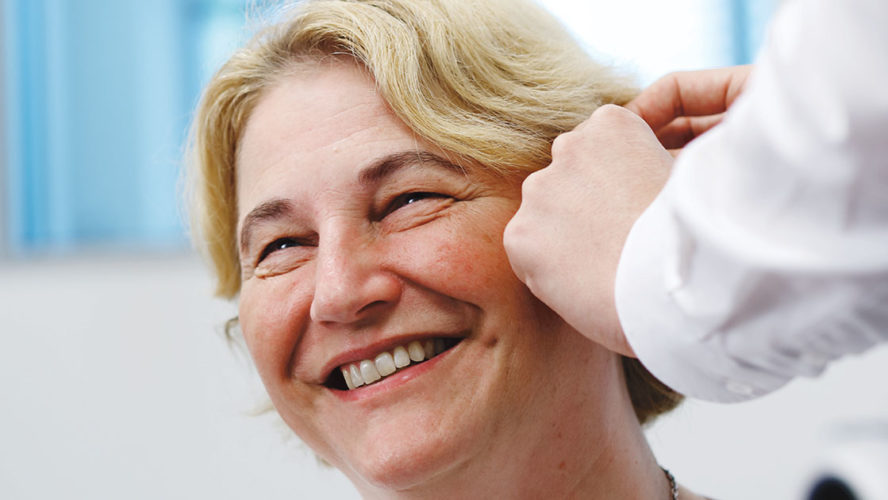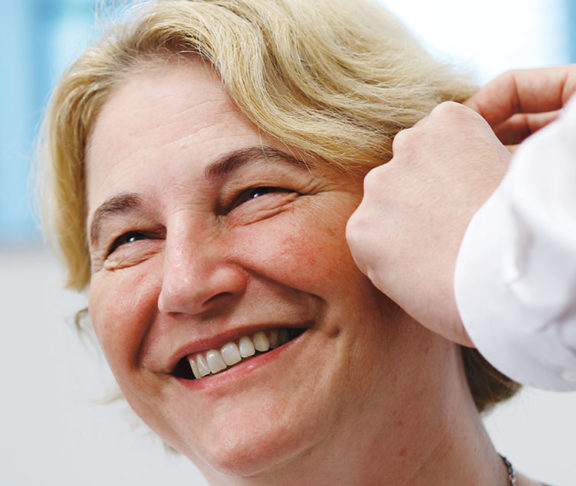
Dr. André Marcoux
Vice President of Audiology and Product Management, WS Audiology Canada
Millions of Canadians live with uncorrected hearing loss because they don’t want to wear hearing aids. But the hearing aids of today are nothing like they used to be.
Maybe I’m having a little bit of difficulty hearing the TV, but I can boost the volume, even though my partner might not like it. Maybe I’m having a little bit of difficulty in settings where a lot of people are talking at the same time, but when things are quiet, I do just fine. I don’t need hearing aids right now.”
When Dr. André Marcoux was in clinical practice, this was a refrain he heard all the time. As we grow older, virtually all of us will encounter some degree of hearing loss. It’s a condition that affects more than half of the over-40 population in Canada, and a whopping 93 percent of those aged 70 to 79. And yet, because we associate hearing loss with aging, and because aging remains stigmatized in our society, only about a third of those with hearing loss make use of hearing aids. Many Canadians will live in denial for years or decades rather than take the simple steps that could dramatically improve their health and their lives.
Dr. Marcoux, who wears hearing aids himself, is profoundly sympathetic to hearing aid hesitancy. Today, as Vice President of Audiology and Product Management at WS Audiology, he’s dedicated to bridging that resistance with a new generation of hearing aids suited to image-conscious Canadians. “We’ve been on this journey to provide more pleasant aesthetics to hearing aids,” says Dr. Marcoux. “These new form factors are really a major step beyond anything we’ve done before. I call it device normalization. At the level of product design, we’ve normalized the hearing aid by making it look like a wireless earbud, a device that carries no stigma whatsoever.”
Early detection and early intervention of hearing loss can minimize cognitive decline and dementia down the road. We want people to be aware of their hearing loss earlier, and to know that hearing aids are not only beneficial for people with severe hearing loss.
Stylish Bluetooth earbuds that also happen to be medical devices
The revolutionary design of the Active Pro hearing aid from Signia is award-winning, introducing an aesthetic that challenges the assumption that medical devices cannot look like mainstream consumer goods. Of course, this radical redesign is only possible thanks to technical innovation allowing ever more miniaturization, and other advancements in hearing aid technology that extends well below the surface level.
The Signia Active Pro also functions as a high-definition Bluetooth headset, connecting directly with phones, TVs, and other devices. It features on-the-go customization through a smartphone app. And it hosts a cutting-edge suite of signal-processing algorithms that do far more than just amplify sound. “We’re now able to do some really cool and very advanced signal processing,” says Dr. Marcoux. “With our recent platforms, we’re able to process speech and noise so effectively that our studies show that, in challenging listening situations, people with hearing loss wearing our hearing aids are able to outperform and understand better than people with normal hearing.”
Uncorrected hearing loss is isolating and unhealthy
These challenging listening situations — noisy environments with a lot of people talking all at once — are exactly the ones where people with hearing loss have traditionally been the most lost. And they’re also some of the richest social environments, providing the psychological nourishment we need. When people with hearing loss say they don’t need hearing aids because they’re fine in quiet environments, it’s not a huge leap to see how that can lead to them choosing to spend more time in quiet environments, exacerbating the social isolation that’s already such a concern among the older population. It becomes a self-reinforcing pattern with worrying implications for cognitive decline.
“We have an increasing body of research that shows that individuals with even mild levels of hearing loss are at elevated risk for future cognitive decline in their older years,” says Dr. Marcoux. “Early detection and early intervention of hearing loss can minimize cognitive decline and dementia down the road. We want people to be aware of their hearing loss earlier, and to know that hearing aids are not only beneficial for people with severe hearing loss. They provide benefit to people with mild or moderate hearing loss as well, regardless of their age.”
At the end of the day, Dr. Marcoux simply hopes that more Canadians will consider hearing aids with an open mind. These devices no longer look like the hearing aids of decades past. They’re sleeker, more convenient, and far more intelligent. And, given that hearing loss is an insidious condition that sneaks up on you slowly and can alter your behaviour without you even noticing, it’s never too early to trial a pair of hearing aids and see — or hear — the difference for yourself.




